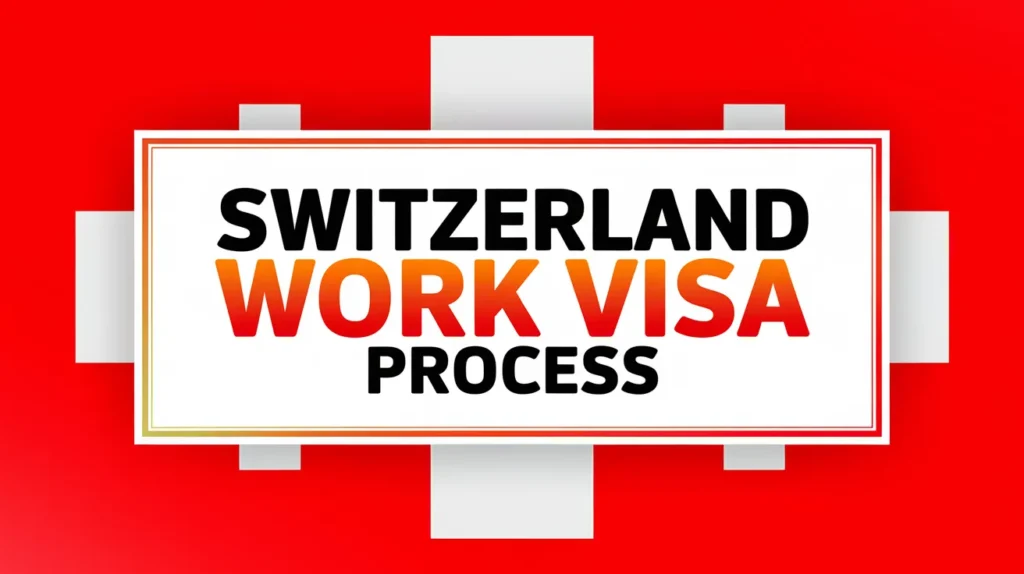
Once you apply for a Swiss visa, you’re applying for a Schengen visa, which permits you to move unreservedly throughout all Schengen nations. Switzerland marked the Assertion on the Free Development of People (AFMP) in 1999, making it less demanding for EU/EFTA (European Union/ European Free Exchange Affiliation) citizens to live and work in Switzerland. EU/EFTA inhabitants don’t require visas to enter or remain in Switzerland for up to 90 days.
To apply for a Swiss visa, you must consider the necessities related to your nationality. Citizens from EU and EFTA nations confront fewer obstacles and are not limited by remote laborer shares. However, nationals from nations recently admitted to the EU may encounter the same tight limitations forced upon non-EU/EFTA citizens.
What may be a Swiss Work Visa?
Obtaining a work permit or work visa in Switzerland has become increasingly troublesome. Non-EU/EFTA nationals who propose to live and work in Switzerland should be mindful that the Swiss government has allowed quantities of input, which permits a certain number of grants to be disseminated yearly. When the amount is met, ex-pats must wait another year to apply for the permit.
- Permit L: This permit suits short-term inhabitants who need to live in Switzerland for less than a year. Candidates will require a substantial business contract lasting 3 to 12 months, and the visa will coordinate that length.
- Permit B: Expats who need to live in Switzerland for longer than a year can apply for a B permit if they have a work contract lasting at least 12 months.
- Permit G: Cross-border commuters who work in Switzerland but live in a border zone are qualified for a G permit. Once at work, they must return to their primary place of home at the slightest.
Requirements
Recently, the Swiss government raised the work permit share for non-EU/EFTA nationals and expanded the dialect prerequisite. Presently, non-Swiss nationals must talk and type in at least an A1 level within the overwhelming dialect of their Swiss canton.
The longer you remain in Switzerland, the more familiarity you must have. If you’re applying for a B-level visa and know none of the four official dialects, you must give verification of enrollment in a dialect course.
EU/EFTA nationals can lawfully live and work in Switzerland for up to 90 days without a work permit. Your boss should enlist your employment through the government’s online entry or with the nearby canton authorities. This must happen sometime recently, beginning with the day of work.
- Be an exceedingly qualified laborer. This implies you’re a supervisor, pro, or other gifted professional.
- Possess a college degree or an identical degree from the next instruction institution.
- I have several years of proficient work experience.
- Provide proof that you will progress in your proficiency and social development in Switzerland. Things taken into consideration incorporate your age, knowledge of the nearby dialect, knowledge of other dialects, and your arrangement to adjust to the Swiss way of life.
For work lasting longer than 90 days, you may require work authorization, which can be noted in your home permit. As it were, EU/EFTA nationals will have a home permit and work permit automatically combined.
Work authorization prerequisites change somewhat from canton to canton, but as an EU/EFTA national, you ought to as it required the following:
- valid visa or residency card
- employment contract
Benefits
- Switzerland is among a modest group of nations with an amazingly low unemployment rate, which suggests that it’s a land of openings for gifted experts. Separate from the shining business prospects, the country’s pay scale is higher than most European states. Additionally, numerous representatives working in Switzerland get twice or three times the compensation individuals get for comparable parts within the rest of Europe.
- In basic terms, if you need to earn a strong salary, Switzerland might be the ideal nation of work and residence for you.
- Swiss schools are some of the best in the world. Whether open schools or private schools, instructive benchmarks stay the same across the board. On top of that, living in Switzerland is affordable, unlike most nations worldwide.
- When choosing a nation to move to, the healthcare framework may be a pivotal factor that helps families decide whether to take the plunge. Switzerland has one of the most excellent healthcare frameworks globally.
- Every inhabitant should take out therapeutic protections within three months after moving to the nation. Once you have the vital scope, you can access top-class healthcare offices. A few might say that the take toll of protection could be a bit much, but considering the broad scope you get from it, the cost you may have to pay is next to nothing.
- Safety may be a critical concern for anybody arranging a move to a different area, particularly if they have a family. No one needs to relocate their family to an area with a high crime rate.
- Luckily, Switzerland has a meager wrongdoing rate, making it one of the most secure nations in the world. You’ll live there comfortably without having to stress about the security of your loved ones.
- Besides the focuses specified above, Switzerland is economically steady and remains within the most monetarily turbulent times due to its impartial standing in world legislative issues. Since it doesn’t take sides or get involved in questionable political issues, it is never influenced by things such as sanctions or exchange confinements. Due to this, individuals living in Switzerland can gain well and maintain their way of life.
Application Process
Once you’ve found work in Switzerland, your manager applies to the migration specialist at their local Swiss canton for your work permit. This gives you the right to live and work in Switzerland. The application is then sent for endorsement to the SEM.
Switzerland work visa stamp
When you’ve found a job, you can apply for your Swiss work visa through the Swiss embassy or department in your domestic nation. In any case, you must have a work permit for some time. Recently, your visa has been permitted. If your work application is fruitful, the cantonal movement specialist will contact the embassy/consulate with visa clearance.
In expansion to submitting your visa application frame, you must provide:
- Photocopy of your international ID or substantial travel ID
- Proof of your work offer (e.g., an offer letter, duplicate of the work contract)
- Your CV and duplicates of instructive and work capabilities in German, French, Italian, or English (interpreted by an official interpreter if necessary)
- As a rule, the visa application takes around 8-10 weeks to process.
Work Visa Costs in Switzerland
A Category D visa currently costs CHF 88. You will have to pay an additional fee (up to 50% over the standard cost) if you want the visa fast-tracked or outside of ordinary working hours. You’ll need to pay at the time of application.
Sum Up
Foreigners are eligible for Swiss citizenship after twelve years of nonstop living in Switzerland. In any case, expats should be mindful that the method is troublesome. It takes three stages, which incorporate examining whether candidates are coordinated with the Swiss way of life, are commonplace with Swiss traditions and conventions, comply with the Swiss-run show of law, and don’t imperil Switzerland’s inside or outside security. The examination is based on cantonal and communal reports. Since then, numerous expats have picked to reestablish their lasting residency visa ceaselessly.
